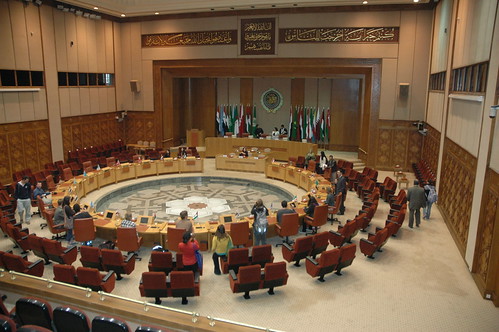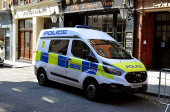
The Arab League on Saturday suspended its controversial observer mission in Syria, a day after the monitors' chief said killing had spiked this week, with the death toll approaching 200.
The announcement came as the opposition Syrian National Council said its leader would travel to New York to appeal to the UN Security Council for protection from the regime of President Bashar al-Assad.
SNC chief Burhan Ghaliun's trip comes amid a new bid by Arab and European states for UN action over the deadly 11-month crackdown on dissent hit immediate opposition from staunch Syrian ally Russia.
"The decision to suspend the Arab League mission in Syria has been taken because of the upsurge in violence, and an official announcement will be made later," an Arab League official in Cairo told AFP on condition of anonymity.
The head of the Arab League monitors said unrest had soared since Tuesday "in a significant way," especially in the flashpoint central cities of Homs and Hama and in the northern Idlib region.
The violence "does not help... to get all sides to sit at the negotiating table," General Mohammed Ahmed Mustafa al-Dabi said.
According to a tally by AFP taken from reports by the Syrian Observatory for Human Rights and official Syrian media, 193 people have been killed since Tuesday.
That compares with the figure of more than 5,400 given by the United Nations last month since anti-regime protests erupted in March.
Amid the upsurge in killing, the country's umbrella opposition group has "decided to head to the Security Council tomorrow, led by Burhan Ghaliun, to present the Syrian case... and demand protection," executive committee member Samir Neshar told an Istanbul news conference.
He spoke after the Gulf Arab states and Turkey, which have led regional condemnation of the Damascus regime, met in Istanbul and called on Assad to accept an Arab League proposal for him to step down and turn over power to his deputy before formation of a unity government.
Syria has categorically rejected the proposal.
Ministers also agreed that international efforts should focus on bringing the bloodshed to an "immediate end" and paving the way for the initiation of a political transition process in line with "legitimate demands of the people."
"We are adamant to turn the Middle East region into a basin for peace, stability and prosperity," Turkish Foreign Minister Ahmet Davutoglu said.
Deadly clashes and an ambush on a bus transporting soldiers claimed at least 15 lives on Saturday, according to activists and state media.
Rami Abdel Rahman, who heads the Britain-based Observatory, told AFP three deserters were killed in Rastan, and five soldiers were killed in similar clashes in nearby Al-Hula, also in Homs province.
The Observatory also reported fierce clashes on the outskirts of Damascus as security forces backed by tanks raided the towns of Saqba, Hamuriyeh, Jisrin and Erbin. There was no immediate word on casualties.
And an ambush on a bus near the rebel stronghold of Douma, just north of Damascus, killed seven soldiers, the official SANA news agency reported, blaming a "terrorist group."
Damascus does not recognise the scale of the protest movement, insisting instead that it is fighting "terrorist groups" seeking to sow chaos as part of a foreign-hatched conspiracy.
Elsewhere, the Observatory said a child was killed in the oil province of Deir Ezzor when a shell struck his house, and a pipeline was also ablaze in Quriah in Deir Ezzor.
At least 384 children have been among the dead in the uprising against Assad's regime, and almost the same number detained, the UN Children's Fund (UNICEF) said on Friday.
The Observatory also said one civilian died of wounds on Saturday near the southern protest hub of Daraa after being shot by security forces.
As the violence rages, wrangling continues over the wording of a draft UN Security Council resolution its supporters want put to the vote in the next week.
Russia made clear that the Arab and European draft formally submitted by Morocco on Friday crossed "our red lines."
Despite the mounting death toll, the Security Council has not adopted a single resolution on the crisis since the protests first erupted.
A previous European draft that would have threatened "targeted measures" against Assad's regime was vetoed by Beijing and Moscow in October.
Backers of the new resolution hope that critics -- who also include India and South Africa -- will be swayed by the tough new stance of the Arab League, which demanded last weekend that Assad hand his powers to his deputy to pave the way for a national unity government ahead of elections.
The new text "fully supports" the Arab League plan and "encourages" all states to follow sanctions adopted by pan-Arab bloc last November, but contains no mandatory action.
Russian Ambassador Vitaly Churkin said the wording crossed "our red lines, where we cannot go."
He said Moscow opposed any hint of sanctions, an arms embargo or "regime change" and was critical of the Arab League, accusing it of seeking to "impose" a solution.
The council has been split on Syria since last year's resolution on Libya, which critics say NATO abused to launch military action in support of the uprising that overthrew Moamer Kadhafi.
AFP, photo by AlMustashriqa









































